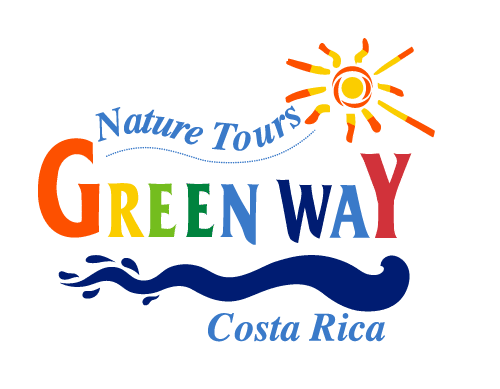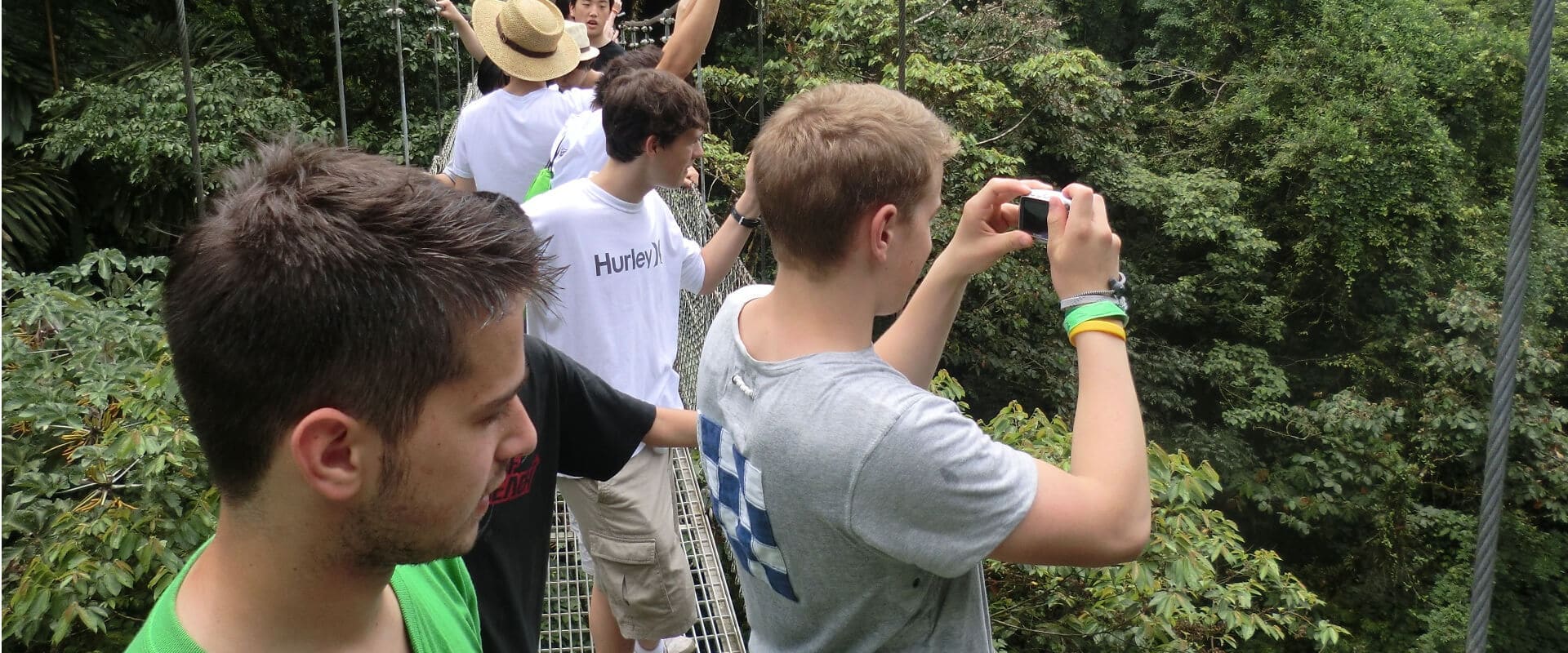Turismo Educativo en Costa Rica
Costa Rica is a wonderful country that offers numerous options for educational tourism and educational tours for students.
With only 51,100 square kilometers and roughly the size of West Virginia in the United States, Costa Rica has 6% of the planet’s total biodiversity. More than 500,000 species of animals and some 9,000 species of vascular plants inhabit this small territory. Approximately 25% of the territory is protected or under conservation through national parks and biological reserves.
Costa Rica is located in the equatorial zone. It is located within the geographical coordinates 8 ° and 11 ° 15 ‘, north latitude, and 82 ° and 86 °, west longitude, which makes it a distinctly tropical country.
Costa Rica is one of the smallest countries in Latin America and it could be said that it is the continent’s belt, since at this point is where the shortest point between the Pacific Ocean and the Caribbean Sea occurs, with only 322 kilometers ( 200 miles).
Costa Rica is a privileged country as it has 2 coasts. In the Pacific it has an area of 1,016 kilometers and in the Caribbean Sea 212.
A very interesting fact about this country is to think that approximately 40 million years ago it did not exist. This area of Central America was just an interoceanic canal that connected the Pacific Ocean with the Caribbean Sea.
However, this area, which is part of the fire belt and its vast extension of volcanic-type mountain ranges, suffered from the impact of great tectonic and volcanic activity.
The constant eruption of underwater volcanoes produced a constant accumulation of lava in the great interoceanic channel and little by little new territories emerged. This is how the first territories were creating what is now considered Costa Rica.
This new territory caused great changes in geography and ecosystems, since the great canal, when closed by the new territory, caused a barrier to be created between the Pacific Oceans and the Caribbean Sea. With this situation, marine species could no longer navigate freely, which caused speciation. The species had to adapt to their new habitats and with the passage of thousands of years they differentiated.
This new territory also created a great bridge between the two great continental masses. What was previously separated as North America and South America, was now connected by this new territory. This phenomenon caused that species from both the north and south could migrate to the new territories, which favored their mixing. The northern species were able to migrate and explore the new territories in the south, and those in the south, explore and migrate north. Because Costa Rica is that great bridge, many of the species adapted to the new territory and that is why today, Costa Rica is considered one of the richest countries in biodiversity in the world.
However, this new territory was also constituted as a biological filter, since many species of animals from the north could not pass to the south and many from the south could not pass to the north, either due to climatological adaptations, food availability, geographical accidents or others.
With this explanation, it is better understood why Costa Rica is a Bridge, Barrier and Biological Filter of great interest worldwide, which has made many scientists, explorers, tourists and educational groups want to explore this territory of great geographical beauty and abundant biodiversity. global level.
Every year, hundreds of groups of students visit the country to learn about biology and natural resources and take part in multiple environmental projects developed by a large number of scientific, ecological and environmental protection organizations.
Also, student groups visit Costa Rica to learn about the tradition of peace that this country has, which, with 200 years of independence, is one of the few countries in the world that does not have an army and lives in a democratic political system. which is an example at the international level.
Despite being a small country and considered underdeveloped, Costa Rica is an example worldwide in many respects. This small country of peace and democracy has 1 Nobel Peace Prize winner, Mr. Oscar Arias Sanchez, who, thanks to his efforts to pacify Central America, won the award in 1987.
At a scientific and aeronautical level, the Costa Rican Franklin Chang was a NASA astronaut who obtained the record for the most trips to space with 7 aeronautical missions in the space Shuttle missions and is a member of the Hall of Fame of NASA. Currently DR. Chang works from his laboratory in Costa Rica developing the plasma engine, which will be the engine that will propel the rockets to Mars in the very near future. This laboratory is open to groups of students by appointment.
Also in the technological area, Costa Rica houses Intel’s high-tech laboratories, where the world’s highest-tech microcomponents are developed.
For groups that visit Costa Rica with the interest of learning about ecology and taking part in a scientific project, those that are of greatest interest are
SEA TURTLE CONSERVATION PROJECTS.
Our country is visited every year by many species of sea turtles. We have 5 species of sea turtles. These nest on almost all the beaches in the country. In some places such as Tortuguero, Playa Nancite, and Playa Grande, the phenomenon of arrivals occurs, which are mass nesting of turtles, so it is possible in a single day to observe thousands of turtles on the beach nesting at the same time.
Thanks to multiple turtle conservation projects, students can participate in nest care and turtle release projects.
The Parque Nacional Tortuguero offers tours for turtle watching at night and Wildlife Refuge Nancite offers programs for students to participate in conservation projects.
ANIMAL RESCUE PROJECTS.
Due to the great abundance of wild species in the country, the advance of urban areas and the destruction of natural habitats, many animals suffer accidents or injuries. For this reason, various shelters have been created to assist them and try to recover them and later release them to their natural habitat. Among these places is the ASIS Project and the Animal Shelter
LA PAZ WATERFALL GARDENS
A place of great attraction is the La Paz Waterfalls . This is a complex of great beauty that has 5 large waterfalls and an animal rehabilitation center. In this center students will be able to enjoy many wild animals in a top quality zoo.
ARENAL VOLCANO NATIONAL PARK .
Arenal Volcano is one of the most important attractions to visit for all foreign tourists who visit Costa Rica. The Arenal area has multiple natural resources and the community has created some of the best attractions for tourists.
The area offers La Fortuna Waterfall. This is a beautiful waterfall that is managed by the community through an association. It is a beautiful natural park where you can explore the tropical forest, admire the waterfall and even swim.
Also in the area there are several projects for adventure activities such as: Mistico Park . This is a private property that has long suspension bridges over the tropical forest. SKY ADVENTURES. It is one of the most beautiful tourist projects in the area and has a cable car, a zipline canopy tour and hanging bridges. This is undoubtedly one of the most important places to visit in Arenal.
RIO CELESTE AND TENORIO NATIONAL PARK
Rio Celeste and Tenorio National Park are attractions that should be included in every student visit to Costa Rica. The Rio Celeste is perhaps the most beautiful river in the country and has a beautiful celestial coloration unique in the world due to an optical effect caused by a chemical component that covers the bottom of the river. The Park has a beautiful waterfall, trails, hot springs and abundant flora and fauna.
SARAPIQUI
Sarapiquí is a region of Costa Rica located in the Caribbean and which has one of the highest levels of biodiversity in the country. It is an area that is important to visit with groups of students since it is easy to observe many wild animals and tropical forest. In the area many tours are offered with professional naturalist guides and you can also participate in special activities such as the chocolate tour, where each student will learn about this plant and can make their own chocolate.
GREEN MOUNT
Monteverde is a Costa Rican classic . This area has a very interesting history since it was founded by a group of quakers who arrived in Costa Rica in the 1950s and who were looking for a place of peace to develop their lives and get away from armed conflicts. They arrived in Monteverde and started multiple livestock and environmental conservation projects at the same time. Today Monteverde is a world example of environmental conservation and has several private biological reserves that protect important species of flora and fauna.

